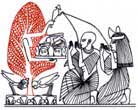Nonviolence:
A Powerful Alternative
The events of September 11 have created a new reality requiring the Palestinian
Authority to abandon, and even to combat, manifestations of armed resistance to
the Israeli occupation. In fact, the PNA has already announced its acceptance of
a unilateral ceasefire, and President Arafat has declared that Palestinians will
not shoot even if fired upon. Furthermore, he has declared the military wings of
all factions to be illegal and is trying to enforce that policy in the face of
blatant provocations by Israel including assassinations and incursions into
Palestinian areas. If the “ceasefire” is not holding, it is not for lack of
effort by the PNA.
Does this mean the end of resistance to the occupation and acquiescence in
continued subjugation of the Palestinians, or is there another method for an
oppressed people to continue their struggle? For those who think only in terms
of armed struggle, it must be a frustrating dilemma: Either bow to the pressure
and accept the occupation or continue armed resistance, which may be
counterproductive and injurious to the cause.
Yet this should not be the dilemma facing Palestinians. In my opinion, the road
is now wide open to engage in a massive campaign of nonviolent resistance to the
occupation. The lessons of the past, as well as of the second Intifada, clearly
point in that direction.
To begin with, Palestinians never were, and are unlikely to be, a match for the
Israelis in terms of brute violence and firepower. While this Intifada has shown
them capable of inflicting losses on the other side and rendering many outlying
settlements insecure, they cannot (alone or even with the support of the Arab
armies) hope to defeat Israel in an open military confrontation. To the
contrary, open warfare provides the justification for Israel to use the full
array of its military might and unites the Israeli public behind the settlers
and the right wing. It also places the Palestinians in an impossible dilemma,
since the more casualties they inflict on Israelis, the less likely their cause
is to prosper internationally and, hence, the less pressure there is on Israel
to accede to their just demands.
By contrast, during the first Intifada, Palestinian unarmed tactics effectively
neutralized the superiority of the Israeli military and split the Israeli public
down the middle. Those tactics also generated effective international pressure
on behalf of the Palestinian cause, and helped reverse hateful stereotypes and
images of the Palestinians.
More importantly, the use of nonviolent tactics allowed all sectors of
Palestinian society to participate in the resistance rather than just the armed
few, which released the creative energies of the people in a beautiful,
unifying, and uplifting struggle full of hope and promise. To be sure, there
were many casualties and much suffering, and the occupation did not end; yet
neither did the present Intifada, which also created many martyrs and much
suffering. The difference was that the nonviolent struggle highlighted the
justice of our cause, which rests on morality, international solidarity, and
international law rather than on brute force and overwhelming military
superiority. To insist on waging the struggle only in the military sphere is,
therefore, doubly foolish because it deprives us of our natural advantages and
allows the conflict to play out in an arena of military violence where our
enemies are vastly superior.
Why, then, does the Palestinian leadership not move into a nonviolent struggle?
I believe there are several reasons for this.
First, while we as a people have often used nonviolent resistance and tactics,
the language and philosophy of nonviolence have remained largely unknown in our
communities and political discourse. Although most of our struggle against the
occupation has been political, such tactics as strikes, demonstrations, human
rights advocacy, non-cooperation, boycotts, insistence on national symbols, and
unarmed resistance to land confiscations have also been used. Even stone
throwing, which while potentially harmful and therefore violent, was mostly
utilized as a form of defiance and rejection of the occupation rather than as a
serious weapon. Note, for example, how Edward Said used it in South Lebanon. Yet
we have never defined these tactics accurately as methods of nonviolent
resistance.
By contrast, we idolized and enshrined the language of “the gun” and made it
central to our political culture despite the fact that the vast majority of the
Palestinian population has never touched a weapon. The presence of the PNA, with
its experience in Lebanon and structure of a traditional Arab regime, only
exaggerated this trend and foolishly suggested that we now actually have a
military force and a military option.
Additionally, there is a misunderstanding of how nonviolence works. Nonviolent
resistance does not guarantee that the other side will refrain from violence or
that there will be no casualties. It simply creates a new paradigm, and uses
“moral jujitsu” to handicap the enemy and turn his superior military force
against himself as he brutalizes a nonviolent opponent.
In my opinion, the main obstacle preventing the widespread adoption of a
nonviolent strategy by Palestinians is the popular confusion of nonviolence with
passivity, timidity, and acquiescence to injustice. In reality, nonviolence
requires greater courage, more discipline, training, and sacrifice, and can be
very militant and proactive. Therefore, as the Palestinian Authority responds to
the new reality by suspending or combating manifestations of legitimate armed
resistance, it would do well to consider the option of nonviolent resistance. If
it does not, then ordinary Palestinians may well consider this as the only
viable alternative, since acceptance of continued occupation is not an option.
***
*** ***
This
article first appeared in Common Ground News on December 11, 2001 and is in the
public domain. No republication restrictions.
| |
|

|
Front Page
|
Editorial
|
Spiritual Traditions
|
Mythology
|
Perennial Ethics
|
Spotlights
|
Epistemology
|
Alternative Medicine
|
Deep Ecology
|
Depth Psychology
|
Nonviolence &
Resistance
|
Literature
|
Books & Readings
|
Art
|
On the Lookout
|

|
|